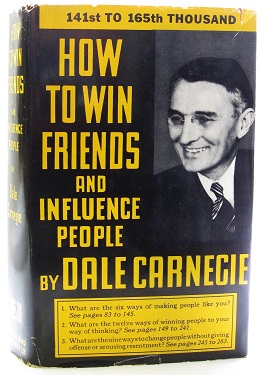How to Win Friends and Influence People
How to Win Friends and Influence People is a self-help book written by Dale Carnegie, first published in 1936. Over the years, it has gone through numerous reprints and editions, becoming one of the best-selling books of all time. The book offers practical advice and techniques for improving social skills, building rapport with others, and becoming a more persuasive communicator. Carnegie's insights into human nature and behavior have made this book a timeless resource for individuals seeking to enhance their personal and professional relationships.
Overview[edit | edit source]
The book is divided into several sections, each focusing on fundamental principles for handling people, making people like you, winning people to your way of thinking, and being a leader. These principles are designed to help readers develop empathy, respect, and influence when interacting with others.
Fundamental Techniques in Handling People[edit | edit source]
This section emphasizes the importance of avoiding criticism, condemnation, or complaints, as these behaviors can alienate others. Instead, Carnegie suggests expressing genuine appreciation for others' qualities and encouraging them to talk about themselves.
Ways to Make People Like You[edit | edit source]
Carnegie outlines simple yet effective strategies for making people feel valued and appreciated, such as smiling, remembering people's names, being a good listener, and genuinely being interested in other people.
How to Win People to Your Way of Thinking[edit | edit source]
In this part, the author discusses techniques for persuading others without causing resentment. This includes avoiding arguments, showing respect for others' opinions, and if you are wrong, admitting it quickly and emphatically.
Be a Leader: How to Change People Without Giving Offense or Arousing Resentment[edit | edit source]
The final section provides guidance on leading others in a manner that encourages cooperation and enthusiasm. Carnegie advises acknowledging one's own mistakes before correcting others, praising improvement, and making the other person happy about doing what you suggest.
Impact and Legacy[edit | edit source]
How to Win Friends and Influence People has had a profound impact on the field of personal development and business communication. Its principles have been applied in various contexts, from personal relationships to professional settings, helping individuals to achieve success and fulfillment in their interactions with others.
The book's enduring popularity is a testament to its effectiveness in conveying timeless truths about human behavior and social interaction. It has been praised for its practical advice, easy-to-understand language, and relatable examples.
Criticism[edit | edit source]
Despite its widespread acclaim, the book has faced criticism from some quarters. Critics argue that its techniques can be used for manipulative purposes, suggesting that the emphasis on influencing others could encourage insincerity or superficiality in relationships. However, supporters of the book argue that when applied with genuine intent, Carnegie's advice fosters mutual respect and understanding.
Conclusion[edit | edit source]
How to Win Friends and Influence People remains a seminal work in the fields of self-help and interpersonal communication. Its principles of empathy, respect, and effective communication continue to resonate with readers seeking to improve their social skills and build meaningful relationships.
Search WikiMD
Ad.Tired of being Overweight? Try W8MD's physician weight loss program.
Semaglutide (Ozempic / Wegovy and Tirzepatide (Mounjaro / Zepbound) available.
Advertise on WikiMD
|
WikiMD's Wellness Encyclopedia |
| Let Food Be Thy Medicine Medicine Thy Food - Hippocrates |
Translate this page: - East Asian
中文,
日本,
한국어,
South Asian
हिन्दी,
தமிழ்,
తెలుగు,
Urdu,
ಕನ್ನಡ,
Southeast Asian
Indonesian,
Vietnamese,
Thai,
မြန်မာဘာသာ,
বাংলা
European
español,
Deutsch,
français,
Greek,
português do Brasil,
polski,
română,
русский,
Nederlands,
norsk,
svenska,
suomi,
Italian
Middle Eastern & African
عربى,
Turkish,
Persian,
Hebrew,
Afrikaans,
isiZulu,
Kiswahili,
Other
Bulgarian,
Hungarian,
Czech,
Swedish,
മലയാളം,
मराठी,
ਪੰਜਾਬੀ,
ગુજરાતી,
Portuguese,
Ukrainian
Medical Disclaimer: WikiMD is not a substitute for professional medical advice. The information on WikiMD is provided as an information resource only, may be incorrect, outdated or misleading, and is not to be used or relied on for any diagnostic or treatment purposes. Please consult your health care provider before making any healthcare decisions or for guidance about a specific medical condition. WikiMD expressly disclaims responsibility, and shall have no liability, for any damages, loss, injury, or liability whatsoever suffered as a result of your reliance on the information contained in this site. By visiting this site you agree to the foregoing terms and conditions, which may from time to time be changed or supplemented by WikiMD. If you do not agree to the foregoing terms and conditions, you should not enter or use this site. See full disclaimer.
Credits:Most images are courtesy of Wikimedia commons, and templates Wikipedia, licensed under CC BY SA or similar.
Contributors: Prab R. Tumpati, MD

